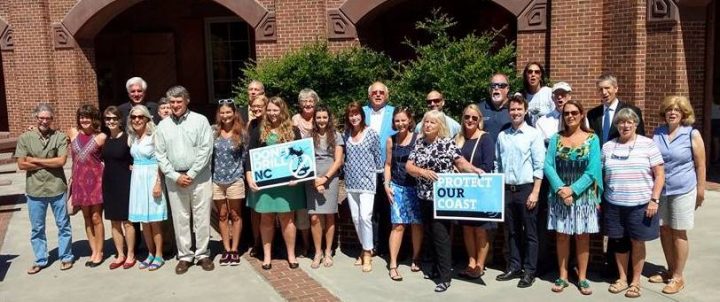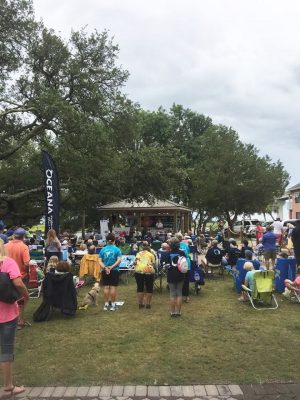
WILMINGTON – Many of them have been down this path before.
Advocating, educating, petitioning – all to create a unified voice of opposition to oil and natural gas exploration and drilling off the North Carolina coast.
Supporter Spotlight
For some of the locals heading up the newly formed Save Our Sea, or SOS, a community-based organization, this is another round in a not-so-long-ago fight.
Now, however, they’re armed with the knowledge gleaned when under former President Barack Obama’s administration the federal government considered opening the Atlantic to seismic testing and the possibility of offshore drilling.
This time, in an area where the success of keeping a cement manufacturing giant from moving in is still fresh, they’re emboldened, bringing to the table the lessons learned from their successes, mistakes and missteps.
“I’d like to think if there was a lesson to learn from that eight-year battle, we really have become a community that is incredibly informed, engaged and, most importantly, empowered,” said Kayne Darrell.

Darrell was forefront in Stop Titan Action Network, the grassroots group that lead a fervent fight for nearly a decade to stop Titan America from opening a cement manufacturing plant in Castle Hayne.
Supporter Spotlight
“Literally, we spent eight years listening to people saying we were wasting our time,” she said.
Darrell is among several locals who’ve joined forces to create Save Our Sea in answer to a call earlier this summer from environmental organizations to form citizen-based groups opposed to offshore drilling.
More than 100 people attended that early June meeting, one spearheaded by environmental advocacy groups, including Oceana and the North Carolina Coastal Federation, in the weeks following President Donald Trump’s reversal of the federal government’s denial of six seismic testing permit applications.
The Trump administration earlier this year directed the Bureau of Ocean Energy Management, or BOEM, to develop a new, five-year program for offshore oil and gas exploration in the Atlantic from Delaware to Florida.
That exploration entails a process known as seismic testing, which uses airguns to shoot sonic waves to the ocean floor. How those waves are reflected from the bottom gives hints to the location and extent of oil or natural gas deposits below the surface.
This method of testing is controversial because the use of sound may disturb the normal behavioral patterns of marine mammals such as right whales and dolphins.
The National Marine Fisheries Service, or NMFS, in June opened a 30-day public comment period on incidental harassment authorizations, or IHAs, which regulate the number of “takes” of marine mammals allowed during seismic testing. That comment period was extended to July 21.
NMFS reviews all proposed seismic activities for incidental “takes,” which are defined as the inadvertent harming, killing, disturbance or destruction of wildlife that may occur during such testing.

The geological and geophysical, or G&G, industry maintains that there are mitigation measures in place to reduce the effects of sei smic blasting on marine mammals. Opponents, including marine mammal experts, argue seismic testing disrupts the mammals’ communication and may cause physiological distress, altering the animals’ migration patterns, feeding and reproduction.
SOS is a group that wants to send the message to elected representatives that the coast of North Carolina “shouldn’t be exploited,” said David Cignotti, another of the groups’ founders.
“We would like to see our state concentrate more on jobs with clean, renewable energy,” Cignotti said. “In all likelihood, any oil or gas jobs won’t stay here. We know that if they drill, there will be spills. I think you can put out a simple message. I think the statistics are on our side.”
Cignotti is a former mayor of Wrightsville Beach. During his time as mayor, he openly opposed offshore drilling in the Atlantic.

“I think we already have put a lot of work in on this issue,” he said. “Now we’re just re-galvanizing this issue and working to try and change the president’s mind. I think it’s going to be real important that we continue to work together.”
Wrightsville Beach is one of 125 communities up and down the East Coast that have since 2013 passed resolutions opposing offshore oil and natural gas exploration and drilling.
SOS organizers say the group will likely work, on occasion, with the Brunswick Environmental Action Team, or BEAT, a citizen-led environmental advocacy organization, in the fight against offshore oil and gas activities.
Members of both groups traveled to Atlantic Beach July 20 to hear Gov. Roy Cooper give a short speech about where his administration stands on the issue.
His message: “Not off our coast.”
Cooper’s words have since been plastered on social media in which groups like SOS and BEAT so heavily depend upon to spread their message.
SOS organizers say they plan to schedule their first public meeting in August. The date will be announced on the group’s Facebook page.







